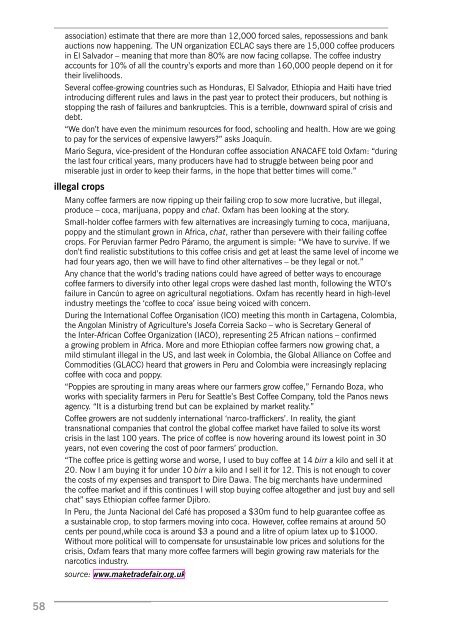Cost of coffee.indd - RISC
Cost of coffee.indd - RISC
Cost of coffee.indd - RISC
You also want an ePaper? Increase the reach of your titles
YUMPU automatically turns print PDFs into web optimized ePapers that Google loves.
association) estimate that there are more than 12,000 forced sales, repossessions and bank<br />
auctions now happening. The UN organization ECLAC says there are 15,000 c<strong>of</strong>fee producers<br />
in El Salvador – meaning that more than 80% are now facing collapse. The c<strong>of</strong>fee industry<br />
accounts for 10% <strong>of</strong> all the country’s exports and more than 160,000 people depend on it for<br />
their livelihoods.<br />
Several c<strong>of</strong>fee-growing countries such as Honduras, El Salvador, Ethiopia and Haiti have tried<br />
introducing different rules and laws in the past year to protect their producers, but nothing is<br />
stopping the rash <strong>of</strong> failures and bankruptcies. This is a terrible, downward spiral <strong>of</strong> crisis and<br />
debt.<br />
“We don’t have even the minimum resources for food, schooling and health. How are we going<br />
to pay for the services <strong>of</strong> expensive lawyers?” asks Joaquín.<br />
Mario Segura, vice-president <strong>of</strong> the Honduran c<strong>of</strong>fee association ANACAFE told Oxfam: “during<br />
the last four critical years, many producers have had to struggle between being poor and<br />
miserable just in order to keep their farms, in the hope that better times will come.”<br />
illegal crops<br />
Many c<strong>of</strong>fee farmers are now ripping up their failing crop to sow more lucrative, but illegal,<br />
produce – coca, marijuana, poppy and chat. Oxfam has been looking at the story.<br />
Small-holder c<strong>of</strong>fee farmers with few alternatives are increasingly turning to coca, marijuana,<br />
poppy and the stimulant grown in Africa, chat, rather than persevere with their failing c<strong>of</strong>fee<br />
crops. For Peruvian farmer Pedro Páramo, the argument is simple: “We have to survive. If we<br />
don’t find realistic substitutions to this c<strong>of</strong>fee crisis and get at least the same level <strong>of</strong> income we<br />
had four years ago, then we will have to find other alternatives – be they legal or not.”<br />
Any chance that the world’s trading nations could have agreed <strong>of</strong> better ways to encourage<br />
c<strong>of</strong>fee farmers to diversify into other legal crops were dashed last month, following the WTO’s<br />
failure in Cancún to agree on agricultural negotiations. Oxfam has recently heard in high-level<br />
industry meetings the ‘c<strong>of</strong>fee to coca’ issue being voiced with concern.<br />
During the International C<strong>of</strong>fee Organisation (ICO) meeting this month in Cartagena, Colombia,<br />
the Angolan Ministry <strong>of</strong> Agriculture’s Josefa Correia Sacko – who is Secretary General <strong>of</strong><br />
the Inter-African C<strong>of</strong>fee Organization (IACO), representing 25 African nations – confirmed<br />
a growing problem in Africa. More and more Ethiopian c<strong>of</strong>fee farmers now growing chat, a<br />
mild stimulant illegal in the US, and last week in Colombia, the Global Alliance on C<strong>of</strong>fee and<br />
Commodities (GLACC) heard that growers in Peru and Colombia were increasingly replacing<br />
c<strong>of</strong>fee with coca and poppy.<br />
“Poppies are sprouting in many areas where our farmers grow c<strong>of</strong>fee,” Fernando Boza, who<br />
works with speciality farmers in Peru for Seattle’s Best C<strong>of</strong>fee Company, told the Panos news<br />
agency. “It is a disturbing trend but can be explained by market reality.”<br />
C<strong>of</strong>fee growers are not suddenly international ‘narco-traffickers’. In reality, the giant<br />
transnational companies that control the global c<strong>of</strong>fee market have failed to solve its worst<br />
crisis in the last 100 years. The price <strong>of</strong> c<strong>of</strong>fee is now hovering around its lowest point in 30<br />
years, not even covering the cost <strong>of</strong> poor farmers’ production.<br />
“The c<strong>of</strong>fee price is getting worse and worse, I used to buy c<strong>of</strong>fee at 14 birr a kilo and sell it at<br />
20. Now I am buying it for under 10 birr a kilo and I sell it for 12. This is not enough to cover<br />
the costs <strong>of</strong> my expenses and transport to Dire Dawa. The big merchants have undermined<br />
the c<strong>of</strong>fee market and if this continues I will stop buying c<strong>of</strong>fee altogether and just buy and sell<br />
chat” says Ethiopian c<strong>of</strong>fee farmer Djibro.<br />
In Peru, the Junta Nacional del Café has proposed a $30m fund to help guarantee c<strong>of</strong>fee as<br />
a sustainable crop, to stop farmers moving into coca. However, c<strong>of</strong>fee remains at around 50<br />
cents per pound,while coca is around $3 a pound and a litre <strong>of</strong> opium latex up to $1000.<br />
Without more political will to compensate for unsustainable low prices and solutions for the<br />
crisis, Oxfam fears that many more c<strong>of</strong>fee farmers will begin growing raw materials for the<br />
narcotics industry.<br />
source: www.maketradefair.org.uk<br />
58




